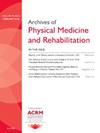Traumatic Brain Injury in US Veterans: Prevalence and Associations With Physical, Mental, and Cognitive Health
IF 3.6
2区 医学
Q1 REHABILITATION
Archives of physical medicine and rehabilitation
Pub Date : 2025-04-01
DOI:10.1016/j.apmr.2024.11.010
引用次数: 0
Abstract
Objective
To examine the prevalence of traumatic brain injury (TBI) in the US veteran population, and physical, mental, and cognitive health conditions associated with TBI.
Design
Retrospective cohort study.
Setting
A nationally representative sample of US military veterans surveyed in 2019-2020.
Participants
Veterans with probable TBI (n=943; M=58.8 years, SD=16.4; 75.9% non-Hispanic White) and without probable TBI (n=3,033; M=63.3 years, SD=15.3; 78.6% non-Hispanic White) were categorized based on a 2-item modified Veterans Health Administration TBI screen or self-reported health professional diagnoses of concussion/TBI.
Interventions
Not applicable.
Main Outcome Measure(s)
Self-reported health professional-diagnosed physical and cognitive health conditions, disability with basic and instrumental activities of daily living (ADLs), positive screens for posttraumatic stress disorder (PTSD), major depressive disorder, anxiety disorder, alcohol use disorder, or drug use disorder, and current suicidal ideation or prior suicide attempts.
Results
Among the full sample, 24.5% (95% confidence interval: 22.7, 26.3) had probable TBI. In adjusted analyses, probable TBI was independently associated with greater odds of rheumatoid arthritis (odds ratio [OR]=2.06), chronic pain (OR=1.87), kidney disease (OR=1.81), pulmonary disease (OR=1.74), arthritis (OR=1.65), migraine (OR=1.59), sleep disorders (OR=1.57), and osteoporosis or osteopenia (OR=1.51). Veterans with probable TBI also had higher odds of mild cognitive impairment (OR=4.53) and disability with ADLs (OR=2.18) and instrumental ADLs (OR=1.98), although ADL disability was explained by other physical health conditions. Probable TBI was associated with higher odds of probable current anxiety disorder (OR=2.82), major depressive disorder (OR=2.17), suicidal ideation (OR=1.78), PTSD (OR=1.72), drug use disorder (OR=1.54), and alcohol use disorder (OR=1.47).
Conclusions
Nearly 1-in-4 US veterans screen positive for probable TBI, which was associated with several physical and mental health conditions that adversely affect health and functioning. Results underscore the importance of multidisciplinary interventions that concurrently target the unique physical, mental, cognitive, and functional health needs of this population.
美国退伍军人的创伤性脑损伤:患病率及其与身体、心理和认知健康的关系。
目的:研究创伤性脑损伤(TBI)在美国退伍军人中的患病率,以及与TBI相关的身体、精神和认知健康状况。设计:回顾性队列研究。背景:2019-2020年对美国退伍军人进行全国代表性调查。参与者:可能患有TBI的退伍军人(n=943;M=58.8岁,SD=16.4;75.9%非西班牙裔白人),无可能的TBI (n= 3033;M=63.3岁,SD=15.3;78.6%(非西班牙裔白人)根据修改后的退伍军人健康管理局TBI筛查或自我报告的健康专业诊断对脑震荡/TBI进行分类。干预措施:不适用。主要结果测量:自我报告的健康专业诊断的身体和认知健康状况,基本和辅助日常生活活动(adl)的残疾,创伤后应激障碍(PTSD),重度抑郁症(MDD),焦虑症,酒精使用障碍(AUD)或药物使用障碍(DUD)的阳性筛查,以及当前的自杀意念或先前的自杀企图。结果:在全部样本中,24.5%(95%可信区间:22.7,26.3)可能有TBI。在校正分析中,可能的TBI与类风湿关节炎(比值比[OR]=2.06)、慢性疼痛(OR=1.87)、肾脏疾病(OR=1.81)、肺部疾病(OR=1.74)、关节炎(OR=1.65)、偏头痛(OR=1.59)、睡眠障碍(OR=1.57)、骨质疏松或骨质减少(OR=1.51)的较高几率独立相关。虽然ADL残疾可以用其他身体健康状况来解释,但可能的TBI退伍军人也有较高的轻度认知障碍(OR=4.53)和ADL残疾(OR=2.18)和器质性ADL残疾(OR=1.98)的几率。可能的TBI与可能的当前焦虑障碍(OR=2.82)、重度抑郁症(OR=2.17)、自杀意念(OR=1.78)、创伤后应激障碍(OR=1.72)、DUD (OR=1.54)和AUD (OR=1.47)相关。结论:近四分之一的美国退伍军人对可能的TBI筛查呈阳性,TBI与几种对健康和功能产生不利影响的身体和精神健康状况有关。结果强调了多学科干预的重要性,这些干预同时针对这一人群独特的身体、心理、认知和功能健康需求。
本文章由计算机程序翻译,如有差异,请以英文原文为准。
求助全文
约1分钟内获得全文
求助全文
来源期刊
CiteScore
6.20
自引率
4.70%
发文量
495
审稿时长
38 days
期刊介绍:
The Archives of Physical Medicine and Rehabilitation publishes original, peer-reviewed research and clinical reports on important trends and developments in physical medicine and rehabilitation and related fields. This international journal brings researchers and clinicians authoritative information on the therapeutic utilization of physical, behavioral and pharmaceutical agents in providing comprehensive care for individuals with chronic illness and disabilities.
Archives began publication in 1920, publishes monthly, and is the official journal of the American Congress of Rehabilitation Medicine. Its papers are cited more often than any other rehabilitation journal.

 求助内容:
求助内容: 应助结果提醒方式:
应助结果提醒方式:


